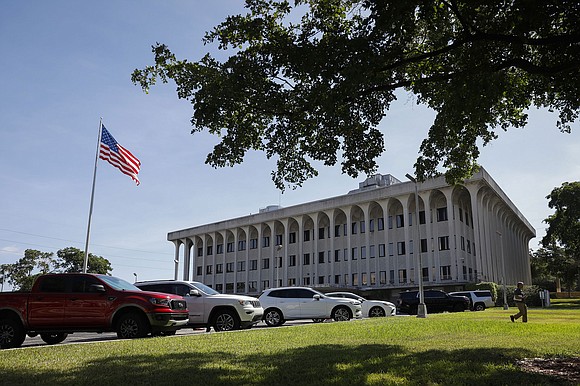What to watch for at Thursday's hearing in Trump's bid for a special master over documents seized at Mar-a-Lago
CNN/Stylemagazine.com Newswire | 9/1/2022, 11:03 a.m.

Originally Published: 01 SEP 22 05:18 ET
Updated: 01 SEP 22 10:27 ET
By Tierney Sneed, CNN
(CNN) -- After an explosive court brief and picture of classified documents from Mar-a-Lago earlier this week, the Justice Department will argue in court Thursday against a request by former President Donald Trump that a so-called special master be appointed in to review the evidence the FBI seized at his Florida resort last month.
US District Judge Aileen Cannon will be considering whether to bring in third party oversight of the Justice Department, in which an outside attorney would in theory identify and filter out evidence that should be withheld from investigators because it was privileged.
Arguing it is unnecessary, prosecutors in court filings Tuesday night provided new details about its investigation into whether classified government documents were illegally mishandled. Lawyers for the former president, who filed a lawsuit last week seeking the appointment, meanwhile argued in a Wednesday night court filing that the Justice Department could not be trusted, as Trump claimed the search itself was unjustified.
Cannon previously signaled an inclination toward granting Trump's request, but that was before the Justice Department's dramatic filing this week.
Here is what to watch at Thursday's hearing, which begins at 1 p.m. ET.:
How sharply does DOJ go after Trump's spin?
Earlier this week, the Justice Department obtained permission from the judge to go substantially over a page limit for the Tuesday filing, and once it was submitted, it was clear why. Prosecutors, as they told the court in what they ultimately filed, wanted to give "detailed recitation of the relevant facts, many of which are provided to correct the incomplete and inaccurate narrative set forth in Plaintiff's filings."
With the details it provided about the events leading up to the search, the DOJ's fling pushed back on several key points the Trump team had made in how it framed the search. Given that Trump suggested Wednesday that it was the government that was being misleading (though he didn't say how), prosecutors may be even more direct in how they rebuke the former president's allegations.
How are the dynamics on Trump team playing out?
Thursday's hearing marks the first time Trump's lawyers will argue in court about the search.
Trump never sought to formally intervene in the separate court fight that played out before a magistrate judge over releasing certain warrant documents. His attorney Christina Bobb showed up in the audience for a hearing in that dispute last month, but just to observe.
With Tuesday's filing, the DOJ made public an attestation she signed to certify that classified materials subpoenaed from Trump in June had been diligently searched for and produced to the FBI. That the FBI found 100 more classified documents in the search in August called 'into serious question" her representations in the attestation.
Meanwhile, Trump has added a new attorney -- former Florida solicitor general Chris Kise -- to his team. He did so after the initial lawsuit filed by his team was flagged by the judge as missing basic legal elements about the request.
Does the judge recalibrate her approach?
Judge Cannon's move to preliminarily announce she was likely to appoint the special master raised eyebrows among outside observers. Even with his lawyers' second go-around at explaining the motion, the Trump's request glossed over several legal questions around the request. And their motion was filed two weeks after the search, meaning that the DOJ could well be done with its internal filter review.
The DOJ's filing Tuesday evening put those concerns further at the forefront, telling the judge that the materials that had been cleared by the DOJ's internal filter team had already been handed to the case investigators.
Prosecutors also aggressively pushed back at Trump's legal claims that his executive privilege concerns warranted the appointment.
"Appointment of a special master to review materials potentially subject to claims of executive privilege would be particularly inappropriate because binding Supreme Court precedent forecloses Plaintiff's argument that review of these materials by personnel within the Executive Branch raises any such privilege concerns," the Justice Department said Tuesday.
If the judge grants the special master review, what does it look like?
Prosecutors told the judge Tuesday that if she was to grant the Trump request, they'd ask for certain conditions for how the special master process would work. They asked for its role to be limited to attorney-client privilege claims and that the process for appealing their decisions to the court be expedited.
More broadly, the DOJ said appointing a special master would impede not just the criminal probe, but also hinder the national security risk assessment being done by the intelligence community.
Among the conditions DOJ asked for was that the special master have a certain level of security clearance if they were going to be reviewing classified materials in the role.



